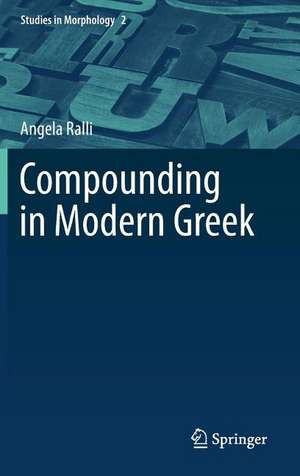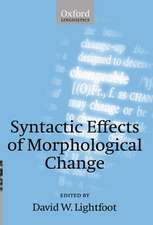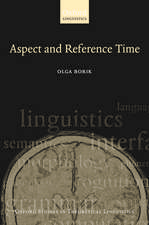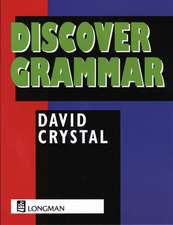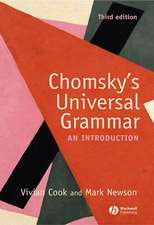Compounding in Modern Greek: Studies in Morphology, cartea 2
Autor Angela Rallien Limba Engleză Hardback – 30 oct 2012
| Toate formatele și edițiile | Preț | Express |
|---|---|---|
| Paperback (1) | 641.38 lei 6-8 săpt. | |
| SPRINGER NETHERLANDS – 9 noi 2014 | 641.38 lei 6-8 săpt. | |
| Hardback (1) | 647.59 lei 6-8 săpt. | |
| SPRINGER NETHERLANDS – 30 oct 2012 | 647.59 lei 6-8 săpt. |
Preț: 647.59 lei
Preț vechi: 761.87 lei
-15% Nou
Puncte Express: 971
Preț estimativ în valută:
123.92€ • 129.64$ • 102.94£
123.92€ • 129.64$ • 102.94£
Carte tipărită la comandă
Livrare economică 02-16 aprilie
Preluare comenzi: 021 569.72.76
Specificații
ISBN-13: 9789400749597
ISBN-10: 9400749597
Pagini: 316
Ilustrații: XIV, 302 p.
Dimensiuni: 155 x 235 x 23 mm
Greutate: 0.62 kg
Ediția:2013
Editura: SPRINGER NETHERLANDS
Colecția Springer
Seria Studies in Morphology
Locul publicării:Dordrecht, Netherlands
ISBN-10: 9400749597
Pagini: 316
Ilustrații: XIV, 302 p.
Dimensiuni: 155 x 235 x 23 mm
Greutate: 0.62 kg
Ediția:2013
Editura: SPRINGER NETHERLANDS
Colecția Springer
Seria Studies in Morphology
Locul publicării:Dordrecht, Netherlands
Public țintă
ResearchCuprins
Acknowledgments.- Abbreviations.- Tables.- Introduction.- Defining a Greek compound.- 2. Grammatical category and constituents.- 3. Compound marking.- 4. Stress and morphological structure.- 5. Headedness and classification.- 6. Constraints, allomorphy and form of constituents.- 7. Coordinative compounds.- 8. Verbal and deverbal compounds.- 9. Deverbal compounds with bound stems.- 10. Compounding versus derivation and inflection.- 11. Compounds versus phrases.- Appendix I Greek: a brief history . Periodization . Geography – Dialectal variation . References.- Appendix II Greek inflection: an overview . Verbal inflection . Nominal inflection . References.- Appendix III List of compounds.- Subject Index.
Textul de pe ultima copertă
One of the core challenges in linguistics is elucidating compounds—their formation as well as the reasons their structure varies between languages. This book on Modern Greek rises to the challenge with a meticulous treatment of its diverse, intricate compounds, a study as grounded in theory as it is rich in data. Enhancing our knowledge of compounding and word-formation in general, its exceptional scope is a worthy model for linguists, particularly morphologists, and offers insights for students of syntax, phonology, dialectology and typology, among others.
The author examines first-tier themes such as the order and relations of constituents, headedness, exocentricity, and theta-role saturation. She shows how Modern Greek compounding relates to derivation and inflection, and charts the boundaries between compounds and phrases. Exploring dialectically variant compounds, and identifying historical changes, the analysis extends to similarly formed compounds in wholly unrelated languages.
The author examines first-tier themes such as the order and relations of constituents, headedness, exocentricity, and theta-role saturation. She shows how Modern Greek compounding relates to derivation and inflection, and charts the boundaries between compounds and phrases. Exploring dialectically variant compounds, and identifying historical changes, the analysis extends to similarly formed compounds in wholly unrelated languages.
Caracteristici
One of the most carefully detailed studies of compounding in any language Provides a thorough, data-rich and theoretically informed treatment of compounding in Modern Greek, which abounds in intricate compound structures Compares Greek compounds with similar formations of languages that are genetically and typologically different ?
